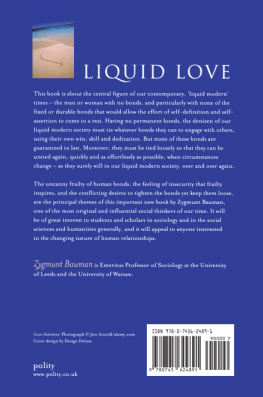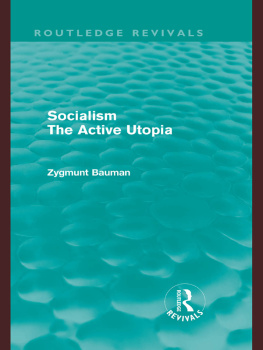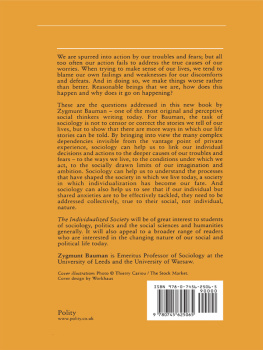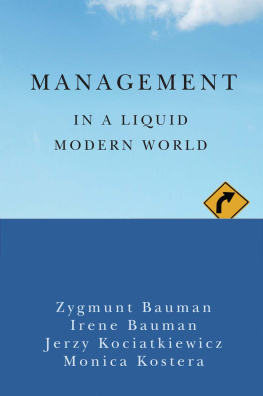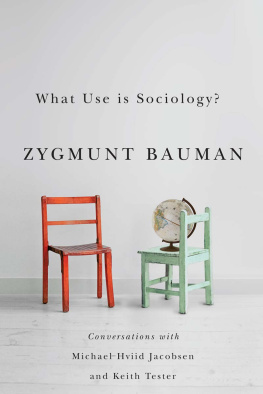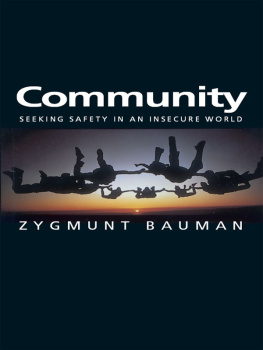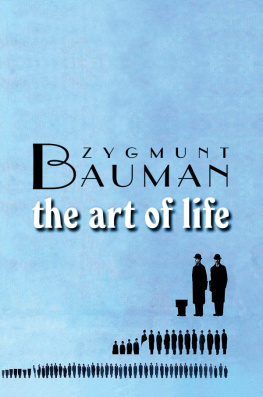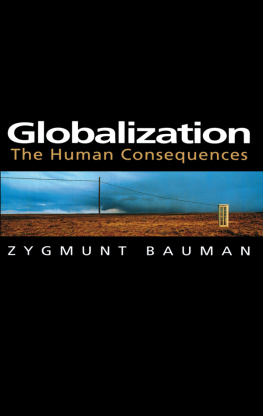Zygmunt Bauman - Strangers at Our Door
Here you can read online Zygmunt Bauman - Strangers at Our Door full text of the book (entire story) in english for free. Download pdf and epub, get meaning, cover and reviews about this ebook. City: Cambridge, year: 2016, publisher: Polity Press, genre: Science. Description of the work, (preface) as well as reviews are available. Best literature library LitArk.com created for fans of good reading and offers a wide selection of genres:
Romance novel
Science fiction
Adventure
Detective
Science
History
Home and family
Prose
Art
Politics
Computer
Non-fiction
Religion
Business
Children
Humor
Choose a favorite category and find really read worthwhile books. Enjoy immersion in the world of imagination, feel the emotions of the characters or learn something new for yourself, make an fascinating discovery.
- Book:Strangers at Our Door
- Author:
- Publisher:Polity Press
- Genre:
- Year:2016
- City:Cambridge
- Rating:4 / 5
- Favourites:Add to favourites
- Your mark:
- 80
- 1
- 2
- 3
- 4
- 5
Strangers at Our Door: summary, description and annotation
We offer to read an annotation, description, summary or preface (depends on what the author of the book "Strangers at Our Door" wrote himself). If you haven't found the necessary information about the book — write in the comments, we will try to find it.
Strangers at Our Door — read online for free the complete book (whole text) full work
Below is the text of the book, divided by pages. System saving the place of the last page read, allows you to conveniently read the book "Strangers at Our Door" online for free, without having to search again every time where you left off. Put a bookmark, and you can go to the page where you finished reading at any time.
Font size:
Interval:
Bookmark:
Contents
Strangers at Our Door
Zygmunt Bauman
polity
Copyright Zygmunt Bauman 2016
The right of Zygmunt Bauman to be identified as Author of this Work has been asserted in accordance with the UK Copyright, Designs and Patents Act 1988.
First published in 2016 by Polity Press
Polity Press
65 Bridge Street
Cambridge CB2 1UR, UK
Polity Press
350 Main Street
Malden, MA 02148, USA
All rights reserved. Except for the quotation of short passages for the purpose of criticism and review, no part of this publication may be reproduced, stored in a retrieval system, or transmitted, in any form or by any means, electronic, mechanical, photocopying, recording or otherwise, without the prior permission of the publisher.
ISBN-13: 978-1-5095-1219-5
A catalogue record for this book is available from the British Library.
Library of Congress Cataloging-in-Publication Data
Names: Bauman, Zygmunt, 1925- author.
Title: Strangers at our door / Zygmunt Bauman.
Description: 1 | Malden, MA : Polity, 2016. | Includes bibliographical references.
Identifiers: LCCN 2016002256 (print) | LCCN 2016009972 (ebook) | ISBN 9781509512164 (hardback) | ISBN 9781509512171 (paperback) | ISBN 9781509512195 (Mobi) | ISBN 9781509512201 (Epub)
Subjects: LCSH: Emigration and immigration--Social aspects. | Immigrants--Public opinion. | Refugees--Public opinion. | BISAC: SOCIAL SCIENCE / Sociology / General.
Classification: LCC JV6225 .B396 2016 (print) | LCC JV6225 (ebook) | DDC 304.8--dc23
LC record available at http://lccn.loc.gov/2016002256
The publisher has used its best endeavours to ensure that the URLs for external websites referred to in this book are correct and active at the time of going to press. However, the publisher has no responsibility for the websites and can make no guarantee that a site will remain live or that the content is or will remain appropriate.
Every effort has been made to trace all copyright holders, but if any have been inadvertently overlooked the publisher will be pleased to include any necessary credits in any subsequent reprint or edition.
For further information on Polity, visit our website: politybooks.com
Migration Panic and its (Mis)uses
TV news, newspaper headlines, political speeches and Internet tweets, used to deliver foci and outlets for public anxieties and fears, are currently overflowing with references to the migration crisis ostensibly overwhelming Europe and portending the collapse and demise of the way of life we know, practise and cherish. That crisis is at present a sort of politically correct codename for the current phase of the perpetual battle waged by opinion makers for the conquest and subordination of human minds and feelings. The impact of the news broadcast from that battlefield now comes close to causing a veritable moral panic (by the commonly accepted definition of that phenomenon, as recorded by the English Wikipedia, the concept of moral panic stands for a feeling of fear spread among a large number of people that some evil threatens the well-being of society).
As I write these words, another tragedy one born of callous unconcern and moral blindness lies in wait to strike. Signs are piling up that public opinion, in cahoots with the ratingscovetous media, is gradually yet relentlessly approaching the point of refugee tragedy fatigue. Drowned children, hastily erected walls, barbed-wire fences, overcrowded concentration camps and governments vying with each other to add the insult of treating the migrants as hot potatoes to the injuries of exile, narrow escape and the nerve-racking perils of the voyage to safety all such moral outrages are ever less news and ever more seldom in the news. Alas, the fate of shocks is to turn into the dull routine of normality and of moral panics to spend themselves and vanish from view and from consciences wrapped in the veil of oblivion. Who remembers now the Afghan refugees seeking asylum in Australia, hurling themselves against the barbed-wire fences of Woomera or confined to the large detention camps built by the Australian government on Nauru and Christmas Island to prevent them from entering its territorial waters? Or the dozens of Sudanese exiles killed by the police in the centre of Cairo after having been deprived of their rights by the UN High Commission for Refugees?
Massive migration is by no means a novel phenomenon; it accompanied the modern era from its very beginning (though time and again modifying, and occasionally reversing, its direction) as our modern way of life includes the production of redundant people ( locally inutile excessive and unemployable due to economic progress, or locally intolerable rejected as a result of unrest, conflicts and strife caused by social/political transformations and subsequent power struggles). On top of that, however, we currently bear the consequences of the profound, and seemingly prospectless, destabilization of the Middle-Eastern area in the aftermath of the miscalculated, foolishly myopic and admittedly abortive policies and military ventures of Western powers.
And so the factors behind the present mass movements at the points of departure are two-fold; but so also are their impact at the points of arrival and the reactions of the receiving countries. In the developed parts of the globe in which both economic migrants and refugees seek shelter, business interests covet and welcome the influx of cheap labour and profit-promising skills (as Dominic Casciani pithily summed it up: British employers have become savvy at how to get cheap foreign workers with employment agencies working hard on the continent to identify and sign up foreign labour); for the bulk of the population, already haunted by the existential frailty and precariousness of their social standing and prospects, that influx signals, however, yet more competition on the labour market, deeper uncertainty and falling chances of improvement: a politically explosive state of mind with politicians veering awkwardly between incompatible desires to gratify their capital-holding masters and to placate the fears of their electors.
All in all, as things stand now and promise to be standing for a long time to come, mass migration is unlikely to grind to a halt; neither for the lack of prompting nor for the rising ingenuity of attempts to stop it. As Robert Winder wittily remarked in the preface to the second edition of his book, We can park our chair on the beach as often as we please, and cry at the oncoming waves, but the tide will not listen, nor the sea retreat. The building of walls in order to stop migrants short of our own backyards comes ridiculously close to the story of the ancient philosopher Diogenes rolling the barrel in which he lived to and fro along the streets of his native Sinope. Asked the reasons for his strange behaviour, he answered that, seeing his neighbours were busy barricading their doors and sharpening their swords, he wished also to add his own contribution to the defence of the city against being conquered by the approaching troops of Alexander of Macedonia.
What has happened most recently, however, in the last few years, is an enormous leap in the numbers added by refugees and asylum seekers to the total volume of migrants knocking at Europes doors; that leap has been caused by the rising number of falling, or rather already fallen, states, or to all intents and purposes stateless and so also lawless territories, stages of interminable tribal and sectarian wars, mass murders and catch-as-catch-can, round-the-clock banditry. To a large extent, this is the collateral damage done by the fatally misjudged, ill-starred and calamitous military expeditions to Afghanistan and Iraq, which ended in the replacing of dictatorial regimes by the open-all-hours theatre of unruliness and the frenzy of violence aided and abetted by the global arms trade unleashed from control and beefed up by the profit-greedy arms industry, with the tacit (though all too often proudly displayed in public at international arms fairs) support of GNP-rise-greedy governments. The flood of refugees pushed by the rule of arbitrary violence to abandon their homes and cherished possessions, of people seeking shelter from the killing fields, topped the steady flow of the so-called economic migrants, pulled by the all-too-human wish to move from barren soil to where the grass is green: from impoverished lands of no prospects, to dreamlands rich in opportunities. Of that steady stream of people seeking the chance for a decent life standard (a stream flowing steadily since the beginning of humanity, and only accelerated by the modern industry of redundant people and wasted lives), Paul Collier has the following to say:
Next pageFont size:
Interval:
Bookmark:
Similar books «Strangers at Our Door»
Look at similar books to Strangers at Our Door. We have selected literature similar in name and meaning in the hope of providing readers with more options to find new, interesting, not yet read works.
Discussion, reviews of the book Strangers at Our Door and just readers' own opinions. Leave your comments, write what you think about the work, its meaning or the main characters. Specify what exactly you liked and what you didn't like, and why you think so.


